According to a new study published recently in the eLife journal, researchers have identified a novel antiviral defense system that can possibly be used for treating several viral infections. The researchers accomplished this feat by discovering a trick used by the hepatitis C virus to evade the immune system.

Image Credit: Kateryna Kon/Shutterstock.com
Viruses employ several strategies to evade immune system defenses. They usually do this by abducting the proteins of the immune system. Cyclophilin A (CypA) is one such immune protein that is often targeted by viruses, such as hepatitis C, HIV, and the SARS coronavirus.
By interpreting how CypA is used by the viruses, researchers can design drugs that work against all these pathogens, including the SARS-CoV-2 virus responsible for causing the COVID-19 pandemic.
Previously, clinical trials have shown that blocking CypA reduces the ability of the hepatitis C virus to replicate and boosts the immune response. We set out to understand how CypA helps hepatitis C evade the immune system.”
Che Colpitts, Study Lead Author and Assistant Professor, Department of Biomedical and Molecular Sciences, Queen’s University
In their experiments, the researchers used hepatitis C-infected human liver cancer cells, both with and without a functioning innate immune system. This innate immune system scans the body for possible threats like bacteria or viruses and activates an immune response.
When the researchers used a tool known as a short hairpin RNA to specifically silence the CypA immune protein, they observed that this prevented the virus from replicating only in the liver cells with a working innate immune system.
The researchers also demonstrated that drugs, known as cyclophilin inhibitors, help block the virus from co-opting CypA and stop it from multiplying.
CypA is known to attach to an immune protein called protein kinase R (PKR), affecting its ability to detect viruses. So, the team used a gene-editing tool called CRISPR/Cas9 to cut out the gene for PKR in human liver cells with a working innate immune system.”
Greg Towers, Study Senior Author and Professor, Department of Molecular Virology, University College London
Towers added, “In cells without PKR, the cyclophilin inhibitors were less able to stop the virus from reproducing. This happened because PKR was not there to identify the virus and trigger antiviral defenses.”
“These findings reveal a new antiviral defense mechanism that suppresses virus growth. This opens the door for the development of CypA-targeting antiviral drugs that can be used against many currently untreatable viruses,” Towers concluded.
Source:
Journal reference:
Colpitts, C. C., et al. (2020) Hepatitis C virus exploits cyclophilin A to evade PKR. eLife. doi.org/10.7554/eLife.52237.